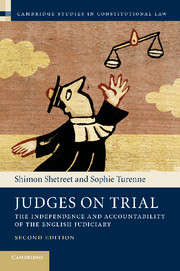Book contents
- Frontmatter
- Contents
- Foreword
- Acknowledgments
- Table of cases
- Table of legislation
- List of Abbreviations
- 1 Introduction
- 2 Constitutional steps towards judicial independence
- 3 The structure and governance of the English judiciary
- 4 Judicial appointments
- 5 Standards of conduct on the bench
- 6 Standards of conduct in extra-judicial activities
- 7 Immunity, discipline and removal of judges
- 8 Freedom of expression and public confidence in the judiciary
- 9 Conclusions
- Annex 1 Courts and tribunals structure
- Index
- References
6 - Standards of conduct in extra-judicial activities
Published online by Cambridge University Press: 05 June 2014
- Frontmatter
- Contents
- Foreword
- Acknowledgments
- Table of cases
- Table of legislation
- List of Abbreviations
- 1 Introduction
- 2 Constitutional steps towards judicial independence
- 3 The structure and governance of the English judiciary
- 4 Judicial appointments
- 5 Standards of conduct on the bench
- 6 Standards of conduct in extra-judicial activities
- 7 Immunity, discipline and removal of judges
- 8 Freedom of expression and public confidence in the judiciary
- 9 Conclusions
- Annex 1 Courts and tribunals structure
- Index
- References
Summary
Introduction
6.1 How much of an ordinary citizen should or can a judge be? It is only appropriate that judicial officers ‘live, breathe, think and partake of opinions’ in the real world, that they ‘continue to draw knowledge and to gain insights from extrajudicial activities that would enhance their capacity to perform the judicial function’. Yet public confidence will only be maintained if judicial office holders maintain the highest standards of probity in their professional, public and private lives. In this chapter, we explore the ramifications of a changing role for the judiciary. As judges get involved on their own initiative in their local communities, some have argued that there is scope for them to do more, and that it is important that some take responsibility for projecting positive images of the judiciary. Yet whether and to what degree a judge should pursue certain extra-judicial activities depends on an elaborate set of considerations. No extra-judicial activity should be so onerous or time consuming that it interferes with the judge’s performance of his duties. It is almost axiomatic that full-time judges should not engage in political controversy. Upon appointment they are expected to give up all activities with a political flavour, such as holding office as a Member of Parliament. One may question the exemption of fee-paid and part-time judges from the ban on full-time judges on political activity of any kind or on any tie with political parties. Certain extra-judicial activities such as chairing public inquiries also tend to politicise the role of judges and detract from their impartial and independent status. Exposure on internet social networks or blogs may also blur the distinction between the private and public spheres for judges. Post-retirement limitations will also be examined.
The ban on political activities
6.2 It seems to be universally agreed that full-time judicial offices are incompatible with membership of the House of Commons. Likewise upon appointment, full-time judges are expected to give up active participation in politics and avoid any political controversy. The Guide to Judicial Conduct provides that ‘a judge must forego any kind of political activity and on appointment sever all ties with political parties’.
- Type
- Chapter
- Information
- Judges on TrialThe Independence and Accountability of the English Judiciary, pp. 243 - 271Publisher: Cambridge University PressPrint publication year: 2013

